In earlier sections, we showed how the theory of evolution affects people like a spell, handing them preconceived notions on which they base irrational, illogical beliefs beyond the realm of possibility. How can educated people who appear to be intelligent, with established careers, accept these unreal scenarios? How can they manage, with no definite proofs, to advocate this theory so vehemently and persuade others to believe it too? In short, how can they perpetuate the Darwinist spell? The answers lie with evolutionists' methods of suggestion and persuasion.
Advanced science and technology have shown clearly that claims put forward by Darwinism are baseless and without proof, but the proponents of Darwinism still resort to various methods to support their theory. But if you ask how the theory of evolution has been so widely espoused despite its scientific invalidity, their attempts to answer are nothing more than powerful, delusive propaganda.
We see this propaganda at work in every area of daily life. But not only today: Since the time evolutionists first proposed their theory, they have always used the same methods to get people to believe the unbelievable. In other words, this theory's being accepted doesn't imply that it has any scientific content. This is also pointed out by David Jeremiah in his foreword to The Long War Against God by Henry M. Morris, noted for his works demonstrating the invalidity of the theory of evolution:
How did belief in Darwinism become so widespread when it was developed mainly by an apostate divinity student (Darwin), a lawyer (Lyell), an agriculturist (Hutton), a journalist (Chambers), and other non-scientists?37
There is only one answer to why the theory of evolution has become so widespread: because of special techniques, tactics and illusions of propaganda.
In order to make themselves and others believe this idea, they cast a kind of spell using methods that we'll examine in detail in the following pages. Just like spell-casters, they use "magic" words to impress their delusions on people's minds; and hypnotize people with pictures and written texts that are impossible for laymen to understand. With all this, they keep people from thinking, investigating and researching for themselves. Just as a sorcerer looks for assistance in the various exotic props, complicated words and miniature texts used in casting a spell, evolutionists look to chance events, fossil bone structures and the impact of authoritative words and sentences. In this way, they attempt to influence people to accept preposterous inferences and to place them under the power of suggestion.
Darwinists do everything in their power to perpetuate this dark spell. Afraid that people will see the truth that the theory of evolution is a myth and change their minds, they employ a persuasive image to convince people with what they say and write, how they appear and how they act. As pointed out earlier, this spell's suggestiveness spreads into every moment of our daily lives: in the morning newspaper, on billboards, in school textbooks, in films and television documentaries.
It will be useful to show all the aspects of these methods of persuasion in order to bring them to people's attention; to help individuals become aware of the various scenes in the scenario enveloping the world they live in. In the following pages, we'll offer some examples of the main rules governing the evolutionists' use of the power of suggestion.
An important method among Darwinists is the suggestion that evolutionist scientists are superior to ordinary human beings—very talented, with strong conceptual abilities, able to understand events and phenomena much better than most. It is vital for Darwinists to assume a sense of this superiority because public opinion is generally influenced by people who are viewed as superior.
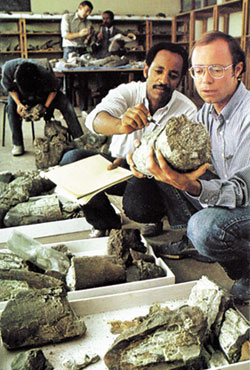
Every fossil expert can look at a petrified bone and suggest information about it. But when evolutionists engage in this ordinary scientific activity, they give the impression of being engaged in something enigmatic and incomprehensible.
Just as some societies believe sorcerers to be superhuman beings with secret powers, so in modern society, Darwinist scientists are thought to be too lofty for ordinary people to question. Most, for example, consider it a great accomplishment to look at fossilized remains and be able to say to what era and to what creature a given bone belonged. People believe that any theory advocated by such accomplished individuals must always be true and valid. For this reason, any one sentence written by an evolutionary scientist has a mesmerizing effect and therefore, many people do not ponder the origins of life or investigate the pertinent facts. They assume that evolutionist scientists have given them all the data they need, and that their statements are absolutely true. They ask, "Who am I to question what they say? I'd need to study for many years to understand them." Indeed, people listen with amazement to these "superhuman" individuals and, even if they do not understand them, they go on listening as if they did.
Proponents of Darwinism want to use this dark power to suppress those who become aware of its errors. They insist that no matter what they do, these individuals will never attain the level of knowledge achieved by these superhuman individuals. Advocates of evolution say that nothing can be accomplished by calling attention to the contradictions and errors of Darwin's theory, and they try to intimidate those who try.
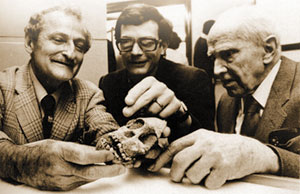
This influence is very strong in some scientific quarters. Turkish Darwinists, for example, regard foreign professors and all scientists who have worked on evolution throughout history as superior human beings. They claim it a major accomplishment if they can understand only parts of the lectures presented by them. They are proud if they can demonstrate some understanding of even a few paragraphs within this complex and incomprehensible mass. If they do manage to achieve this, then they enter into discussions, write papers and give talks about the little they were able to understand.
Turkish Darwinists also believe that world-famous professors have thousands of pieces of evidence about human evolution, as well as information about fossils, mutations and natural selection, that prove the validity of evolution. They think that evolutionist scientists do not reveal all the proofs they have simply because ordinary people couldn't understand these abstruse scientific facts; and that proofs released to the public are on a level simple enough for them to understand.
However, the truth is otherwise. With the development of science, it has become clear that these individuals, presented as respected scientists, have no evidence to prove their theory apart from a handful of false evidence and fabrications. The invalidity of these misleading interpretations has been shown hundreds of times by scientific investigation. (For detailed information in this subject, see Harun Yahya's Darwinism Refuted, Goodword Books, 2003 and The Evolution Deceit, 8th Edition, Taha Publishing, 2003.)
In conclusion, it is obvious that the evolutionist scientists perceived as superior are really trying to promote an imaginary scenario with their handful of false proofs and boundless suppositions. From this point of view, these individuals' knowledge, intelligence and learning lose their importance. They may well have a lot of learning, but they don't perceive the truth in it or draw from it the right conclusions. In the Qur'an, Allah speaks of those who are led astray by their knowledge, unable to see the plain facts:
Have you seen him who takes his whims and desires to be his god—whom Allah has misguided knowingly, sealing up his hearing and his heart and placing a blindfold over his eyes? Who then will guide him after Allah? So will you not pay heed? They say, "There is nothing but our existence in this world. We die and we live and nothing destroys us except for time." They have no knowledge of that. They are only conjecturing. (Surat al-Jathiyya: 23-24)
In these verses, Allah describes the state of those people who, in spite of their knowledge, are unable to conceive of His existence or the existence of the afterlife, and who claim that there is no life beyond this world. Evolutionists are just like these people, in that they are limited by their knowledge to a few ideas and are far removed from reality. Because of the spell they are under, they are like the people Allah states in these verses who really cannot feel, see or understand.
The great admiration for Darwin and evolutionist scientists felt by the proponents of the theory of evolution is one important result of the power of suggestion we spoke of earlier. For this reason, in everything written about Darwin, the scientific defeat of his theory of evolution is covered up, and his errors concealed. Darwin is often praised as the genius of the century—even of the millennium. He is variously called the "Lord of the Species," "a unique human being," and presented as a "valued scientist" who loyally advocates his theory in spite of all the difficulties it presents.
Actually, however, Darwin is the architect of one of the most serious errors in the history of science. His theory rests on no concrete evidence; it is only a logical proposal as he himself acknowledged. In one long chapter, "Difficulties on Theory" in The Origin of Species, Darwin admitted that his theory could not account for some important questions. He himself made frequent mention of the problems, in some of the comments he made:
Long before having arrived at this part of my work, a crowd of difficulties will have occurred to the reader. Some of them are so grave that to this day I can never reflect on them without being staggered.38
He also voiced his concerns in letters he wrote to his friends:
Pray do not think that I am so blind as not to see that there are numerous immense difficulties in my notions.39
From these comments, it is clear that his theory had come to a major impasse, and not only Darwin became aware of this. After Darwin's death, his son, Francis, made this evaluation of his father's work:
My father's mind was not scientific, and he did not try to generalize his knowledge under general laws; yet he formed a theory for almost everything which occurred. I do not think I gained much from him intellectually.40

One chapter in Charles Darwin's The Origin of the Species deals with the problems confronted by the theory of evolution. This chapter, entitled, "Difficulties on Theory," reveals the unsound reasoning on which the theory is founded.
Francis Darwin's statement contains an important truth. The Origin of Species is trumpeted as one of the most important works in the history of humanity, but anyone who hoped to find in it solid scientific proof for evolution would be surprised and come away empty handed. There is no solid proof anywhere in The Origin of Species to support the theory of evolution; it names no new species that evolved through the process of natural selection; it demonstrates no transitional form and documents no evolutionary mechanism. The only interesting thing in the whole book, actually, is its being complete speculation, founded on probability, imagination, conjecture and supposition.
Therefore, this book should not have exerted such an influence on people's lives and ideas. Many scientists have expressed their surprise on reading The Origin of Species,—for example, the American physicist H. S. Lipson:
On reading The Origin of Species, I found that Darwin was much less sure himself than he is often represented to be; the chapter entitled "Difficulties of the Theory," for example, shows considerable self-doubt. As a physicist, I was particularly intrigued by his comments on how the eye would have arisen.41
Despite the scientific inadequacy of Darwin's theory, the most intelligent people disregard this fact because they are under the spell of Darwinism.
Proponents of Darwinism present themselves as intelligent, modern and contemporary individuals possessing vast stores of information, and brand those who believe in Creation as backward, conservative bigots. This kind of mentality appears frequently in evolutionist books and publications.


Henry Morris and his book, The Long War Against God.
Statements based on no concrete proof are made everywhere, to the effect that the theory of evolution is now a scientific fact, a proven law that everyone accepts. This being the case, anyone who rejects evolution is treated as an ignoramus in those quarters where it is accepted. Henry Morris tells how evolutionists regard those respected scientists who accept Creation:
In fact, so committed to evolutionism are most modern psychologists and philosophers (with whom they have a close kinship) that they now tend to regard biblical Christianity itself—especially creationism—as a form of mental disorder. In fact, any form of religion is considered by many evolutionists to be unhealthy, a vestige of sociological pressures in the animal societies from which they claim humans developed.42
As he says, evolutionists present their theory to the public with an aura of scientific acceptance, accusing as "dogmatic" scientists who draw their attention to the fact of Creation. However, in assuming this stance, they are displaying their own dogmatism, pretending not to see the proofs for Creation in all the scientific facts that creationist scientists set out. Out of blind allegiance to their theory, they take no account of the concrete evidence their opponents present, and try to defend their ideas no matter what.
In this regard, we can give an example from statements that evolutionists themselves have made. In his book, Origins: A Skeptic's Guide to Creation of Life on Earth, the noted evolutionist, Robert Shapiro, writes of his dogmatic attachment to the theory of evolution:
Some future day may yet arrive when all reasonable chemical experiments run to discover a probable origin for life have failed unequivocally. Further, new geological evidence may indicate a sudden appearance of life on the earth. Finally, we may have explored the universe and found no trace of life, or process leading to life, elsewhere. In such a case, some scientists might choose to turn to religion for an answer. Others, however, myself included, would attempt to sort out the surviving less probable scientific explanations in the hope of selecting one that was still more likely than the remainder.43
What Shapiro wants to say is quite clear. The fact that he and many other evolutionists are attached to Darwinism as if spellbound, leads them to reject the existence of Allah. This is what's indicated by the logic of "No matter what proof we see, we will not believe in Creation." But this mentality is not confined to present-day evolutionists; those in the past also shared the same dogmatic approach. In the Qur'an, Allah tells us some important things about such people who condition themselves to reject Him. For example, the same mentality is demonstrated by some people who, after Moses showed them many miracles, said to him,
"No matter what kind of Sign you bring us to bewitch us, we will not believe in you." (Surat al-A‘raf: 132)
They accused Moses (peace be upon him) of wanting to bewitch them, but did not realize that they were already under a spell that made them deny Allah. Today, there are people with the same mentality, under the Darwinist spell, for whom the rejection of Allah is a matter of principle. They are so far gone that they do not even realize what they are doing. For this reason, they—like their counterparts in the past—accuse proponents of Creation of dogmatism.
In addition to what we said above, evolutionists claim that most people believe in evolution and that it played a role in the origins of life. They are constantly suggesting that they are in the majority, and that the majority is always right. They try to put psychological pressure on others with such comments as, "Everyone believes in evolution, why don't you?"
One Turkish evolutionist academic has admitted that these methods of suggestion are wrong. According to Arda Denkel, a professor of philosophy at Bogazici University, evolutionists suggest that their theory must be true because so many people accept it. But, he said, this means nothing from a scientific point of view. In an article published in the Cumhuriyet scientific supplementary journal Bilim ve Teknik (Science and Technology), he writes:
Simply because many respected people and institutions adopt the theory of evolution, does that prove its authenticity? Or, will a judicial verdict confirm its validity?...[They say;] "In our country too, the theory of evolution is supported by all prominent scientists, the chairmen of TUBA [Turkish Academy of Sciences] and TUBITAK [The Scientific and Technical Research Council of Turkey], rectors and deans." The support of such respected people is doubtlessly gratifying. However, can the truth be confirmed by the approval of respected authorities? Let's remind ourselves of a historical fact; All alone, Galileo Galilei opposed the respected people and jurists and especially the scientists of his day (there were no women among them, since women were not involved in such scientific endeavors). But wasn't Galileo Galilei telling and advocating the truth? Did the Inquisition invalidate his claims? The support of the respected and widespread members of society does not convey authenticity, nor does it directly ensure that a belief is scientific.44
Denkel says that, even though Turkish evolutionists resort to such methods of suggestion, they can produce no definite scientific proof in support of Darwinism. He says further that Turkey's most influential critic of Darwinism, the Bilim Arastirma Vakfi (Science Research Foundation), has the most concrete scientific proof against it:
Evolutionist scientists, while stressing the type of "excuses" I criticized above, say, "Besides, many scientists and institutions have published thousands of articles and books refuting Creationists' myths." Can one expect a serious result from words that are uttered thoughtlessly? Here, in my opinion, is where the heart of the matter lies... A truly scientific attitude would reveal what these "thousands of articles and books" assert. It should display or outline to the reader, at least a few of their data and arguments. With this group of scientists, however, such is not the case. On the contrary, handouts circulated by the Science Research Foundation (SRF), continually put forward critical justifications written from their own stance. I have no idea what denial I could offer if anyone were to say that the members of the group had fallen behind the SRF in terms of being scientific by publishing a manifesto... Unless some scientists with a good grasp of this issue provide scientific refutations for the justifications put forward by the SRF, appealing to authorities or hoping patriotic literature to get results will be only a daydream.45

In an article in Cumhuriyet Bilim Teknik (a Turkish scientific supplementary), Arda Denkel explains how evolutionist intimations have no scientific meaning
Science, Creationists and Evolution I have no idea what denial I could offer ifanyone were to say that the members of the group had fallen behind the SRF in terms of being scientific by publishing a manifesto. A truly scientific attitude would reveal what these "thousands of articles and books" assert. It should display or outline to the reader, at least a few of their data and arguments. With this group of scientists, however, such is not the case. On the contrary, handouts circulated by the Science Research Foundation (SRF), continually put forward critical justifications written from their own stance.
Denkel is a scientist who supports the theory of evolution, but he is also prepared to admit that Darwinists have no scientific resources to rebut evidence that invalidates their theory and rely only on the effectiveness of baseless propaganda. Evolutionists' major refuge is in the hackneyed suggestion that Darwinism is accepted by the whole world.
Today, however, it is evident that this isn't so. Those who care to look at science objectively must take into account the great number of scientists who have abandoned the theory over the past 20 to 30 years. To avoid doing this is departing from objectivity. Today, as in the past, many scientists have come out from under the evolutionist spell to see the reality of Creation in the world; and have produced a great deal of work to show the invalidity of evolution. Neither philosophers nor theologians, these are well-seasoned academics and experts in fields such as biology, biochemistry, microbiology, anatomy and paleontology; and come from countries like America, England, Israel and Australia. (For more detailed information, see Harun Yahya's The Qur'an Leads the Way to Science, Nickleodeon Books, 2002.) Only somescientists accept evolution, and not the entire scientific world.
scientific world.
Moreover, we must make it clear that there's no value in being in the majority; and evolutionists are not the only ones to make this suggestion. Throughout history, many of those who have rejected the superior creation of Allah have advocated that they are correct because they represent the majority. With such suggestions as "Look, everyone rejects religion; can so many people be wrong?" they've tried to divert people from the path that Allah invites them to follow. Allah cautions his faithful servants against these kinds of individuals, and warns that conforming to the majority will only bring them harm:
If you obeyed most of those on earth, they would misguide you from Allah's Way. They follow nothing but conjecture. They are only guessing. (Surat al-An‘am: 116)
In other verses, Allah tells us that many people in the past ignored the warnings they were given, declaring that they were in the majority, but that this was of no use to them. He says that those who attained salvation were those who believed:
We never sent a warner into any city without the affluent people in it saying, "We reject what you have been sent with." They also said, "We have more wealth and children. We are not going to be punished." Say: "My Lord expands the provision of anyone He wills or restricts it. But the majority of mankind do not know it." It is not your wealth or your children that will bring you near to Us—only in the case of people who believe and act rightly; such people will have a double recompense for what they did. They will be safe from all harm in the High Halls of Paradise. (Surah Saba': 34-37)
One major tool in the power of persuasion used by supporters of Darwinism is the suggestion that an idea is incomprehensible. These demagogues try to impress by using terms and Latin names that many people cannot understand; their impenetrable style employs dizzying logic and strange, irrelevant examples. The method behind all of this is the bewitching principle of "incomprehensibility."
Their writings and lectures string words together in such a way that many cannot understand them; their effect on people is just like that of a sorcerer using strange magic words as he conjures a spell. Their incomprehensibility is even accepted as a sign of the authors' breadth of knowledge, power and virtue; and this impact increases with the obscurity of their words. The scientist who speaks or writes in the most opaque manner is touted as the most brilliant.
This ploy that evolutionists use especially in titles of their articles, is why so many people say from the start that they could not possibly understand such lofty knowledge. As examples, here are the titles of some of their articles:
"Crystal structure of the hereditary haemochromatosis protein HFEcomplexed with transferrin receptor"
"An electroneutral sodium/bicarbonate cotransporter NBCn1 and associated sodium channel"
"Glycosylation of Nucleocytoplasmic Proteins:Signal Transduction and O-GlcNAc"
All the subjects indicated in the titles above are of course serious topics deserving of scientific investigation. It may be quite appropriate to use such terms in an appropriate place. But using such words won't help evolutionists get around their great impasse, for many other basic questions stand in the way of their theory that evolutionists have to answer, but cannot.
Evolutionists must especially answer how the first cells and first living creatures came into being. Where did the mind-bogglingly sophisticated systems within a cell come from? And how did the imaginary transition from sea to land occur? Alternatively, they must explain what clear proofs there are for such matters as the supposed evolution of human beings, the origin of the extraordinary characteristics in animals, the source of self-sacrifice and intelligent behavior in living creatures. They must also give concrete proof for their claims about the gradual formation of structures like DNA, eyes and wings; about the development over time of cells' ability of to synthesize proteins flawlessly, and of blood to clot. As yet, no evolutionist has come forward to present any clear, concrete proof of these most basic matters regarding the formation of living creatures. When you examine their lectures, books and articles, you will see that, when required to explain these matters, they try to divert attention by hiding them behind countless scientific terms, Latin words and sentences that ordinary people cannot understand.
Taking this point of view, we can see that the theory of evolution is a word game based on empty talk, interesting inferences, guesses and suppositions. It relies on long philosophical excursions and repetition of words that serve only to keep people from thinking. From the few titles of articles listed above, you can see that it is a word game based on incomprehensibility.
Evolutionists believe that they will reach their goals by using such methods, thinking they've given the impression of stating something in a highly scientific style. However, they are benefiting only from the fact that the general public knows very little about scientific matters.
To bring even more clarity to the matter, we can cite George Stavropoulos, a proponent of the theory of evolution, from an article he wrote in the journal American Scientist:
Yet, under ordinary conditions, no complex organic molecule can ever form spontaneously, but will rather disintegrate, in agreement with the second law. Indeed, the more complex it is, the more unstable it will be, and the more assured, sooner or later, its disintegration. Photosynthesis and all life processes, and even life itself, cannot yet be understood in terms of thermodynamics or any other exact science, despite the use of confused or deliberately confusing language.46



To give their theory a scientific tone, evolutionists adorn their unsubstantial writings with incomprehensible words, as these texts show.
Stavropoulos clearly states that some explanations given by evolutionist scientists are complex and deliberately convoluted. Moreover, he openly admits that no branch of science can cast light on the processes of life.
Uncovering these Darwinist games and tactics is no doubt important for those who don't know much about the matter and puts a heavy responsibility on those who are aware of how evolutionists use the power of suggestion. Carrying out this responsibility is one obvious way to remove the lies and fabrications blocking advances in the scientific world.
Those caught under the dark spell of Darwinism do not want to dispel it. If they can help it, they do not read books, papers or scientific reports debunking Darwinism because they believe such literature is very dangerous. They become very upset if they hear of books and activities that go against what they believe. News of the publication of a book demonstrating the collapse of Darwinism is the worst news they could receive, because people might buy and read it. For those who want to preserve the spell, their greatest fear is that people will read opposing ideas, evaluate them and then come to know the truth.
They hesitate to let their followers to read this kind of literature, because they themselves have never read it. At their lectures, in their books and in their conferences, the salient message they give is people should not read this literature. They fear not for themselves, but that other Darwinists will lose their faith. They're especially upset at the prospect that young people will come to know that Darwinism is a fabrication, since they trust that youth will be defenders of the theory in the future. Seeing them as a guarantee for the future, they want to make sure that youngsters never lose the suggestions about Darwinism put into their minds. In order to protect them from supposedly dangerous influences—that is, from people who tell them the facts of Creation—they make every effort to insulate their pupils from the outside world.




Books with cold and incomprehensible appearance.
According to Darwinist principles, to lend a scientific appearance to a given topic, the first attribute is "coldness." Evolutionists try to make their books seem heavy, gloomy and cold. They arrange their books' cover designs and content so as to make them seem hard to read and understand. Their illustrations and pictures are usually incomprehensible drawings and vague pictures consisting of abstract shapes, incomprehensible bone fragments and stones. Plenty of complex graphics and numerical calculations, they believe, will make their works appear more sophisticated. In this way, they hope to convey the impression that evolution is "scientific," but that people cannot comprehend this, due to their lack of knowledge.
They hesitate to let their followers to read this kind of literature, because they themselves have never read it. At their lectures, in their books and in their conferences, the salient message they give is people should not read this literature. They fear not for themselves, but that other Darwinists will lose their faith. They're especially upset at the prospect that young people will come to know that Darwinism is a fabrication, since they trust that youth will be defenders of the theory in the future. Seeing them as a guarantee for the future, they want to make sure that youngsters never lose the suggestions about Darwinism put into their minds. In order to protect them from supposedly dangerous influences—that is, from people who tell them the facts of Creation—they make every effort to insulate their pupils from the outside world.

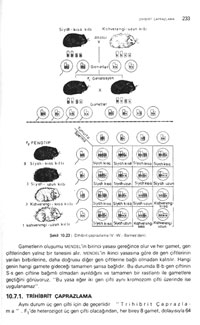

One common feature of books promoting evolution is their austere appearance and incomprehensible contents. The purpose is to make these books look as if they contained abstruse scientific knowledge. Complicated graphics and obscure mathematical calculations only add to this illusion.
To achieve this, they first gather young people together in camps and courses they have organized and instill strong suggestions in their minds. They educate them with incomprehensible words, complex narratives and depictions; this education continues while they eat, play sports, read books and converse. They meet together so often in the belief that in order for the Darwinist "trance" not to be broken, youth need to be kept under constant observation and under the power of suggestion. Even the shortest break could let some suspicion enter their minds that the theory of evolution is a myth.
They want to prevent youth from reading works about the invalidity of evolution and the fact of Creation out of fear that their trance will be broken, the spell will lose its effect, and that young people will entertain doubts about the theory. To remove such doubts, the only thing they can do is exaggerate the idea of the significance and the power of evolution. Teilhard de Chardin was one of the leaders of Universal Humanism in France; these words he wrote are a clear example of this kind of evolutionist discourse:
Is evolution a theory, a system, or a hypothesis? It is much more—it is a general postulate to which all theories, all hypotheses, all systems must henceforth bow and which they must satisfy in order to be thinkable and true. Evolution is a light which illuminates all facts, a trajectory which all lines of thought must follow—this is what evolution is.47
From this quote, we can see that Chardin is blindly attached to evolution, even if scientific evidence points in the opposite direction. And, in a tactic used generally by all evolutionists, he proclaims his faith in no uncertain terms. Against the possibility that supporters may read and be influenced by other ideas, evolutionists always speak with total certainly. If they read anything that says that logic and evidence from science have invalidated evolution, they take measures to keep their followers from abandoning the theory by such reasoning as this: "Even if there is no proof for evolution, nevertheless it has happened."
Umit Sayin, a long-time writer for the evolutionist journal Bilim Utopya (Science Utopia), expresses this blind allegiance with the words, "Let's assume that we have not found any fossils yet; then this shows that all life forms have disappeared, or amalgamated into nature," or "Let's say that all fossils had not ended up as we hoped! Even such an incident does not make the theory of evolution collapse."48 So, in order that no supporter may be influenced by any work explaining the scientific invalidity of evolution, he took measures on his own to prevent the breaking of the spell.
Darwinists' main aim is to prevent their supporters from thinking, because any person of conscience would take very little time to realize how much evidence points towards the theory being invalid. So, making use of every means at their disposal, they bombard their followers with propaganda, leaving them no time to think for themselves. They use advertisements, movies, music videos, song lyrics, cartoons, books, articles and anything else they can find to perpetuate the spell's effect. Their purpose is to have people memorize a few words and catchy phrases and become familiar with images. They occupy our every moment with imaginary transitions from apes to human beings, fossil images and reconstructions of primitive man. Newspapers and magazines belabor the subject—whether in passing or comprehensively, with a single word or entire text—to ensure that all is in order not to break the spell.
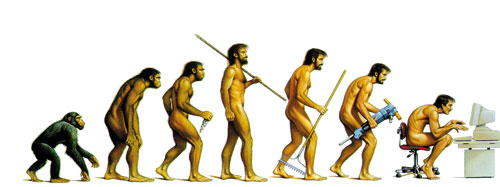
Evolutionists know perfectly well that doubting their theory leads to religion and the acceptance of Creation. Therefore, they try to perpetuate the spell in daily conversation, which is the reason behind all their anti-religious anecdotes, conversations, caricatures and writings. The motive behind their anti-religious humor and almost insulting comments is to dissuade individuals from the slightest tendency toward religion and to destroy all doubts that arise in their minds about the origins of life.
The evolutionist design to forestall people from thinking can be illustrated by a recent occurrence in 1999, when our book entitled The Evolution Deceit was distributed in all parts of Turkey. Readers saw all the facts proving that the idea of evolution was full of deceptions. This created an atmosphere of panic among Turkey's evolutionist and materialist circles; they were threatened that The Evolution Deceitwas informing people about their theory's scientific invalidity. What upset them most was the chapter entitled "The Secret Beyond Matter," which demolished the materialists' philosophical idea that everything is composed of matter.
The person who expressed most clearly the worry and panic experienced in Turkey's evolutionist-materialist circles was Rennan Pekunlu, a lecturer and writer for Bilim Utopya (Science Utopia), a journal whose mandate is to promote materialism. Both in articles for the journal and in comments on a number of panel discussions, Pekunlu indicated that The Evolution Deceit was a major threat. Beside the chapters debunking Darwinism, what worried him most was the section entitled "The Secret Beyond Matter." Pekunlu sent a message to his readers and to his few listeners telling them not to be taken in by these ideas and to remain loyal to materialism. For his thesis, he found support in Vladimir I. Lenin and advised everyone to read Materialism and Empirio-Criticism, the book Russia's bloody communist leader wrote a century earlier. But the only thing Pekunlu managed to accomplish was to repeat Lenin's warning to his readers not to think about this subject, or they would be carried away by religion. In his article, Pekunlu quoted these words of Lenin's:




FALSE!
Above: Various film stills familiar to everyone. Depicting half-human, half-ape characters is a classic method to prevent breaking the evolutionist spell.
Once you deny the objective reality [that is] given us in sensation, you have already lost every weapon against fideism [reliance on faith alone], for you have slipped into agnosticism or subjectivism—and that is all that fideism requires. A single claw ensnared, and the bird is lost. And our Machists [an adherent of Machism, a modern positivist philosophy], have all become ensnared in idealism, that is, in a diluted, subtle fideism;They became ensnared from the moment they took "sensation" not as an image of the external world, but as a special "element." It is nobody's sensation, nobody's mind, nobody's spirit, nobody's will.49
These words reveal that the reality—which Lenin himself feared and wanted to erase from his mind as well as his comrades'—is the same thing that worries evolutionist-materialists today. But Pekunlu and other materialists have much more to worry about than did Lenin: Compared to a hundred years ago, the truth has become clearer, stronger and more definite. For the first time in history, this truth is being discussed in a very challenging way—posing a great danger for the Darwinist spell that materialists have taken such pains to perpetuate. (For a detailed discussion of this matter, see Harun Yahya's The Evolution Deceit, 8th Edition, Taha Publishing, 2003.)
Scientists who support the theory of evolution pretend to answer a question without really doing so. When confronted with a question they can't answer, they weave long and complicated sentences, so that people who know little about the subject will doubt their ability to understand it. They'll think they are in the presence of a "great" scientist. And, no matter what nonsense comes out of his mouth, they will be influenced by the way he strings sentences together in a way that sounds beautiful.
"Do not call on any other deity along with God. There is no god but Him. All things are passing except His Face. Judgment belongs to Him. You will be returned to Him." (Surat al-Qasas: 88)
One example concerns the transitional forms that evolutionist paleontologists cannot account for. Following is a quotation from a Darwinist's book on the subject of transitional forms. After declaring that there's a basic explanation for them, author Richard Milner gives the following strange example:
Transitional fossils ("links" between major groups) are notably rare because most species remain stable for long periods. When change occurs, it is fairly rapid (in relation to the geological time), and often begins among small, isolated populations. Imagine a multi-level parking garage frozen in time. Large "populations" of cars would be found on the various floors, but only a few on the ramps. The time the cars spent in the ramps is short compared to time they remained parked, yet each must have traveled the ramp.50
To briefly consider the reasons for the irrationality of this answer: First, there are millions of living species in the world today. According to evolutionists, each of them evolved in slow stages from another creature. For example, we can look at the imaginary change of a starfish into a fish. First, there was a starfish; then two arms of the starfish begin to take the shape of fins. Then it develops a backbone. Later, other changes in its body become noticeable. And in the final stage, there is no more starfish; there is a fish. Now let us look at the relation between this example and the imaginary claims of evolutionists. Of course, there is no relation between the above analogy of a parking garage and the imaginary stages in the formation of living creatures. That is, cars can afford to be parked in a garage for long periods of time, but those creatures that are said to have evolved have no time to wait.

FALSE!
The evolutionists' imagination is lively enough to transform a starfish into a fish.
According to the evolutionist claim, any species had to undergo this evolutionary change within a specific period of time. This means that there must have been many transitional forms. So, it is no longer a question of life forms in stasis, similar to the cars parked in a garage, with very rare episodes of sudden transformation. On the contrary, there must be millions upon millions of transitional stages for every one of the myriad of species alive in the world today. How strange that there is not one extant example of these millions of transitional forms!
Now it becomes apparent just how meaningless and deceptive such examples are. Actually, evolutionists themselves may be aware that their examples don't correspond to reality, but they want to give the impression that they haven't remained mute but given thoughtful answers to such questions. In this way, they hope to preserve the faith of their supporters.
To answer questions posed by the fact of Creation, evolutionists give courses, hold panel discussions, and write books containing the kind of logic we saw in the above examples. With these initiatives, they try to indicate that the spell has not been broken and that they are continuing as usual. They want to send the message that that they are still standing on their two feet, and to have that message reach the right people, they publish books and journals that only illustrate the hopelessness of their position. Their publications are nothing more than works of rhetoric designed to console one another, but do not give any response to basic scientific evidence that invalidates their theory. They talk repeatedly about the same subjects as if no proof had been given to cause their theory's collapse.
One of the most serious impasses for evolution is the molecular stage in the appearance of life on Earth. From a molecular point of view, the theory of evolution has not been able to explain how life began or how proteins and cells—the building blocks of life—came into being. Disregarding all such objections, evolutionists opt to concentrate on questions of secondary importance.
For example, as Michael J. Behe states in his book, 80% of the articles on molecular evolution published in the Journal of Molecular Evolution (JME), the world's best known molecular biology periodical, have to do with the comparison of amino acid sequences. For example, all the amino acids of two proteins are arranged and examined in a series or the nucleotides on a DNA molecule are compared. Behe says that this comparison does nothing to remove the impasse confronting molecular evolution. He writes:


Michael Behe and his book, Darwin's Black Box.
But the root question remains unanswered: What has caused complex systems to form? No one has ever explained in detailed, scientific fashion how mutation and natural selection could build the complex, intricate structures discussed in this book.51
The reality stated in Behe's words is quite clear: Evolutionists give no clear answer to questions about life's real origins, because it's impossible to answer these questions in terms of evolutionary processes and random stages of development. For this reason, they ignore their deficiencies and continue to perpetuate the Darwinist spell. They fill their publications with irrelevancies, decorative illustrations and Latin words that have nothing to do with proving evolution. In this way, they obscure their explanations of basic subjects and trust that they have deceived people.
As we have often pointed out, one of Darwinists' main characteristics is their skill in rhetorical demagoguery. They are very deft in their use of language and word games. It may seem as if they are saying a lot, whereas they are actually stating nothing of substance. In spite of the hours they spend in their conferences, they cannot utter a single word to substantiate their theory. They aim to make people believe them by releasing an avalanche of complicated words and explanations, thereby creating the illusion that what they say follows along scientific lines.
Darwinists go into detail about geology, genetics, medicine and other areas that have nothing to do with the basics of evolution. They discuss these issues at such length, in such a weighty manner that they put their listeners into a stupor. They insert evolutionist explanations into subjects that have nothing to do with their theory, creating the impression that they are actually relevant to their topic and support their propositions. For instance, they deliver long-winded speeches about recent developments in genetics. But in what they say, there is nothing to support the theory of evolution. Despite this, they end their articles or lectures by saying, "You see, the science of genetics provides important evidence for the theory of evolution," in this way, giving the impression that genetics corroborates evolution.
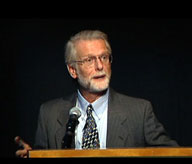 Christopher Wills
Christopher WillsThey also get people under their dark spell by such deceptions as: "We do have a lot of evidence, but not have enough time to consider it all, so, we'll talk about something else." Or, "This book—or even an encyclopedia—isn't big enough to contain the proofs for evolution, so I will talk only about one or two," or, "I could explain proofs for the theory of evolution, but you wouldn't understand, so never mind." This way, they never resolve the basic questions that their theory should. The evolutionary biologist Christopher Wills resorts to the same method in one of his books:
It will be necessary first to take a quick glance at some of the evidence that has accumulated since the time of Darwin about how evolution works. I will try to make this as painless and interesting as possible. There is in any case no way a book this size could cover it all. A friend of mine has been working on an encyclopedic evolution book for years and I wish him luck.52
However, what Wills says here has no relation to reality. As we said earlier, evolutionist claims are totally incredible since they clearly go against scientific discoveries. So he is completely wrong to state there is more proof than can be fitted into an encyclopedia. He repeats this explanation so often to cover up why evolutionists always present the same supposed proofs in every book and in every lecture. The proof they offer has in fact been frequently refuted in many anti-evolutionist publications. Evolutionists realize that if they acknowledge these facts, they'll be forced to admit the invalidity of their theory. For this reason, it seems, they act as if no one has refuted their proofs.
Phillip E. Johnson states that the theory of evolution is supported only by demagoguery and the power of persuasion:
The theory is sustained largely by a propaganda campaign that relies on all the usual tricks of rhetorical persuasion:hidden assumptions, question-begging statements of what is at issue, terms that are vaguely defined and change their meaning in midargument, attacks on straw men, selective citation of evidence, and so on. The theory is also protected by its cultural importance.53
It is possible to give many examples of the rhetoric that Johnson mentions. One good example of the word games that evolutionist scientists play to deceive people is the following statement by the Turkish Darwinist, Umit Sayin:
Life originated in the Earth's sea or lakes; or the molecular information likely to form life came from meteorites or comets falling from space.54
Here, Sayin accounts for the beginnings of life in a very unclear way, and based on no scientific evidence. He always uses equivocal expressions so that, if evolution is not tenable in terms of this world, he can leave a door open to outer space. From statements like these, it's clear that evolutionists have nothing to say about the origins of life.
Another method Darwinists employ is to select examples that have nothing to do with logic or reason and propose them as if they indicated some major scientific reality. Evolutionists mislead the public by giving examples from daily life to make illogical ideas seem reasonable. We looked at one example of this—comparing a transitional fossil to a car in a parking garage—earlier, but it will be useful to give further examples.
A pertinent example is one that Umit Sayin took from an evolutionist by the name of Tim M. Berra. In his book, Berra showed a series of pictures of the 1953, 1962, 1978 and 1990 models of a Corvette and suggested that "the descent with modification is overwhelmingly obvious" in this process and that "this is what paleontologists do with fossils."55
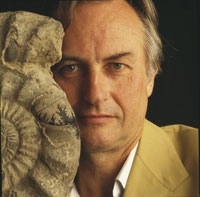

Richard Dawkins
It's easy to see how irrational and unrealistic this example is. The author speaks about the "evolution" of a Corvette, never attributing it to the long, coordinated work of engineers, designers, and computers—as if it were wholly a result of the chance effects of mountain winds, lightening, rain and sunlight. However, no Corvette appeared by chance. It is a beautiful sign of creation. So Berra's example proves not the theory of evolution, but Creation. The public in general has never considered these matters to any great extent, however, because their opportunities to do so are limited, and so evolutionists can exploit them for their own ends. In what they say and write, they hide behind their positions as scientists and employ many senseless explanations.
Books by Richard Dawkins, one of the world's most noted evolutionist scientists, frequently feature examples designed to portray evolutionary theories in a comprehensible and rational light. In his book, The Selfish Gene, he writes that genes may be compared to Chicago gangsters:
The argument of this book is that we, and all other animals, are machines created by our genes. Like successful Chicago gangsters our genes have survived, in some cases for millions of years in a highly competitive world.56
Dawkins cannot explain how even one gene came into being, but does make the preposterous comparison, suggesting that genes survive as the result of chance events. But what a pity that readers who know nothing about the subject may accept this as logical and convincing, just because Dawkins is a professor.
As we can see from the examples so far, Darwinists have nothing else to do but try to persuade people with absurd analogies such as Chicago gangsters, Corvettes and parking garages. Apart from such empty examples, they have no accepted scientific findings to prove their assertions.
Another point to stress in relation to the evolutionists' suggestive rhetoric is their continued use of their empty words and formulas in place of scientific proof. Through such persuasive methods, these "magic" words and formulas occur dozens, even hundreds of times in every book they write, so as to implant them in readers' minds. They load their sentences with expressions such as, "If human beings exist today, evolution must have happened," "Humans are the most highly developed animals," "Among all the species of animals, only human beings . . . ," "Finally, evolution's missing link has been found," "In the transition from primitive to modern man … , " "definitely proven, unquestionable facts, has been proven once again, there is no doubt." All these expressions intend to insinuate in people's minds the idea that their every statement has a scientific foundation. In their book Hamlet's Mill:An Essay Investigating the Origins of Human Knowledge and Its Transmission Through Myth, Giorgio de Santillana and Hertha von Dechend state that evolutionists use this method:
Gradually, we are told, step by step, men produced the arts and crafts, this and that, until they emerged in the light of history . . . Those soporific words "gradually" and "step-by-step" repeated incessantly, are aimed at covering an ignorance which is both vast and surprising. One should like to inquire: Which steps? But then one is lulled, overwhelmed and stupefied by the by the gradualness of it all, which is at best a platitude, only good for pacifying the mind, since no one is willing to imagine that civilization appeared in a thunderclap.57
An Evolutionist's Ploy

- Some of the Books Published by Creationists
- Some of the Books Scientists Wrote in Response to Creationists
Another example of evolutionists' demagoguery came from Umit Sayin, again in the magazine Bilim Utopya. After providing a brief list of a few books printed in the past and criticizing evolution, Sayin's article went on to give a longer list of twenty or so books under the heading "A few books written by scientists in response to Creationists." He then resorted to an infantile logic, "Evolutionists have many more publications, so evolution must be true." The fact is that even in the last few years, a large number of works and studies by American, German, Israeli and Australian scientists have appeared, showing—with scientific data and methods—that the theory of evolution is a hypothesis whose validity has been disproved by all branches of science. These books have left not a single evolutionary scenario unanswered and undemolished. There is, therefore, no need for thousands of books and studies to state that the myth of evolution is totally fictitious. Just one small paperback can undermine many volumes promulgating evolution. The simple fact that not even a single protein could ever materialize by chance is enough to refute evolution completely.
(The History of Evolutionists, Harun Yahya, p. 122)
Actually, if any ordinary person used the terms mentioned in the above quote, he wouldn't be considered reliable. But when someone acting sure of himself and looking like a serious scientist uses this style, people listen with amazement.
The word "programmed" Dawkins uses has the kind of magical effect we've been talking about. He uses this word frequently in his books; in The Selfish Gene, for example, he analyses the phenomenon of altruism from an evolutionary point of view: "It may just be more difficult to learn altruism than it would be if we were genetically programmed to be altruistic."58 Throughout his book, Dawkins speaks constantly of creatures being programmed and analyzes their behavior based on this idea. But he cannot answer questions about who did the programming, how creatures were programmed and what the purpose of this programming is. According to Dawkins, there is a program of which the programmer is unknown. If someone asked Dawkins, and those who share his mindset, who created the program, they would probably reply—to perpetuate the Darwinist spell—that it's a "miracle of nature."
Someone whose awareness isn't clouded by Darwinism's spell can easily understand that nature could not encode in the genes of living creatures the millions of bits of information it contains; no creature in nature possesses one bit of this information by its own will that it can encode in another being.
Obviously, it is Allah, with His supreme power and knowledge, Who created the genetic information in every creature. But someone under the influence of the evolutionist spell does not understand this. The veil over his eyes means he cannot see the plain truth. In the Qur'an Allah gives us many examples of this spiritual state. It tells us that throughout the course of history, there have been those who could not see the obvious fact of Creation. Allah reveals this outright inability to understand in the following verse:
As for those who disbelieve, it makes no difference to them whether you warn them or do not warn them, they will not believe. Allah has sealed up their hearts and hearing and over their eyes is a blindfold. They will have a terrible punishment. (Surat al-Baqara:6-7)
Another method Darwinists use to perpetuate their spell is to present topics that have nothing to do with evolution as "evidence" for the validity of their theory. For example, they'll write pages about the marvelous examples of Creation to be found in the bodies of humans and animals, but end their treatise by saying, "Here is a beautiful product of evolution." But learning how a system functions is not enough to understand how and why it came into being. By observation, for example, we can learn how the solar system works, how the planets interact with one another, and how fast they rotate. That does not relate to how and why the solar system came to be—but this is what evolutionists do. They talk endlessly about matters of genetics, space research, biology, anatomy, geology and sociology; but never do deal with the basic question of how or why these things came into existence.
According to the noted American professor of biochemistry, Michael J. Behe, evolutionists strive to explain every subject, relevant or irrelevant, in terms of evolution:
The theory has even been stretched by some scientists to interpret human behavior: why desperate people commit suicide, why teenagers have babies out of wedlock, why some groups do better on intelligence tests than other groups, and why religious missionaries forgo marriage and children. There is nothing—no organ or idea, no sense or thought—that has not been the subject of evolutionary rumination.59
Julian Huxley, one of the leading evolutionists of the twentieth century, explains how they want to have their theory accepted as a principle encompassing the whole universe:
The concept of Darwinism was soon extended into other than biological fields. Inorganic subjects such as the life history of stars and the formation of the chemical elements on the one hand, and on the other hand subjects like linguistics, social anthropology, and comparative law and religion, began to be studied from an evolutionary angle, until today we are enabled to see evolution as a universal and all-pervading process.60
As the above examples show, their goal is to persuade the public that evolution is a universal principle and a process that encompasses everything. Therefore, they rate everything from economy to the marriage as a matter of evolution. At the same time, this method lets evolutionists cast their spell over every area of life. For example, when speaking about technological operations or the development of computers, at any moment they can stop what they are saying to make a comment devoid of all scientific meaning such as, "This is a fine example of the process of evolution." Any thinking person, free of the evolutionist spell, can easily understand that this comment is like a Communist ideologue saying, "Marx was right again: The dollar has lost value in relation to the German mark." Surely, Marxist ideology has nothing to do with the dollar and the German mark, just as the supposed process of evolution has nothing to do with computers.


One classic technique that evolutionists use is to title an article to give the impression that it's about evolution, when it gives only general information on the subject or is about a totally irrelevant topic. For example, the headline of the article entitled "New Zealand," contains such stereotyped terms as, "fringe of the evolutionary raft." The rest of the coverage includes general information and photographs about the natural beauties of New Zealand. A similar tactic is used in the other articles. This technique seems intended to give the impression that the article has something to do with evolution, although the text contains nothing to prove evolution.



Misleading Titles And Coverage
These journals' reports contain tiny references tucked away in a corner or else make covert evolutionary suggestions by using the terms "natural selection," or "the evolution of a modern brain." However, instead of offering proofs regarding evolution, all they actually contain is facts confirming creation—such as the extraordinary features of creatures which use camouflage. Even if the pages-long coverage is about the signs of creation, such journals still include strained references to evolution with no substance in their reports.
Darwinists loyal to their theory present scientifically unwarranted topics to the public as if they were facts. For example, a presenter takes a simple fossil bone; for hours he discusses the complex information revealed by various markings on the bone; he gives the bone a Latin name that most people cannot pronounce, together with exhaustive information about the ancestors and the lifestyle of the person to whom the bone belonged. Ordinary people are very impressed by his presentation. Listeners assume he knows a lot about the bone's provenance and authenticity and that everything he says rests on scientific evidence. But the truth is otherwise; the presentation is nothing other than a deceptive game with supposed proofs.
Just like a sorcerer, an evolutionist takes bones into his hand and creates the illusion that it can reveal many secrets about the evolutionary process. But actually, he has no proof that can let him make any assertions.
In order to understand this matter better, it will be useful to examine a book explaining the origins of human life and the process of evolution, written by a fossil expert who is a proponent of the theory of evolution. The most important aspect of any book written by an expert would be in descriptions relevant to the geographical region where he conducts his studies. As in a legend or a tale, the writer describes the region's climate, flora and fauna, mountains, lakes and meadows, in order to put the reader out of touch with his personal reality and usher him into an imaginary world. Because he has no substantial evidence, he must resort to obfuscation and telling of fairytales in order to influence and persuade the public. But when the topic of discussion comes to the fossils that have already been discovered, we see something very interesting: His account of fossils begins with long descriptions of an environment that supposedly existed millions of years ago. Based on no information or discoveries, he makes statements such as, "These are the places where our ancestors lived." Some statements contain interesting admissions—for example, in his book The People of the Lake, the world-famous fossil expert Richard Leakey admits that it is actually not possible to learn very many details from a piece of bone:
Now, if we are absolutely honest, we have to admit that we know nothing about Ramapithecus; we don't know what it looked like; we don't know what it did; and, naturally, we don't know how it did it! But with the aid of jaw and tooth fragments and one or two bits and pieces from arms and legs, all of which represents a couple of dozen individuals, we can make some guesses, more or less inspired.61
The important sentences to read here include, "we have to admit that we know nothing" and "we can make some guesses, more or less inspired."The man who wrote these statements is one of the world's best known fossil experts, whose suppositions are highly respected and regarded as scientific proof. So just what kind of suppositions does this scientist make throughout his book?
When experts first discover a fossil, generally they make surprising suppositions about the creature's size, environment, what land areas it inhabited, how and what it ate, its physical structure in relation to other individuals, its habits, whether it was two or four-footed, its social life and reproduction patterns, whether it was hairy, its colors and level of intelligence. A look at Richard Leakey's interpretations in his The Origin of Humankind of the fossils he discovered will be useful in understanding the kind and extent of experts' suppositions.

When interpreting fossils, Richard Leakey, noted evolutionist, did not rely on proof, nor did he abstain from using his instincts.
For instance, a group of early humans, might have spent some time beneath a tree simply for the shade it afforded, knapping stones for some purpose other than butchering carcasses—for example, they might have been making flakes for whittling sticks, which could be used to unearth tubers. Some time later, after the group had moved on, a leopard might have climbed the tree, hauling its kill with it, as leopards often do. Gradually, the carcass would have rotted, and the bones would have tumbled to the ground to lie amid the scatter of stones left there by the toolmakers. How could an archeologist excavating the site 1.5 million years later distinguish between this scenario and the previously favored interpretation of butchering by a group of nomadic hunters and gatherers? My instinct was that early humans did in fact pursue some version of hunting and gathering, but I could see Isaac's concern over a secure reading of the evidence. 62
In these statements, Leakey clearly says that these detailed descriptions are based not on science, but on "instinct." In a similar statement, Leakey indicates the importance of the power of dreaming in the science of fossils:
Although we can never know for certain what daily was like in the earliest times of Homo Erectus, we can use the rich archeological evidence of site 50, and our imagination, to re-create such a scene, 1.5 million years ago...63
After saying this, Leakey goes on for five pages to construct a dream-like fantasy. The details create the impression that he has seen and is reporting what he has gone and observed. Anyone reading it wouldn't think that it was the product of a fossil scientist's imagination, but that, every description was based on clear evidence. From Leakey's statements, however, we can see that his description is nothing more than hallucinations caused by the spell of Darwinism. His explanations do express no scientific reality, but are based totally on his broad imaginative power.
Darwinists are carrying on a serious campaign of suggestion to persuade a significant number of people to accept the idea that half-human, half-ape creatures lived at one time. Visual methods are an important part of this campaign; people may forget what they hear, but do remember what they see.
Evolutionists' most widespread use of visual suggestion is to be seen in reconstructions from fossils. Pictures or models can be made of a creature from which only one bone fragment has been found. All the "ape-men" you have seen in newspapers, magazines and films are reconstructions.
The man pictured below uses his imagination to make artistic reconstructions. All the half-man and half-ape creatures you see in films, newspapers and magazines come from the imaginations of people like this. But no such intermediate creatures ever existed..
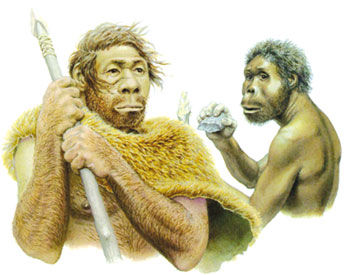
The fossil record of human origins is fragmentary and incomplete, and any suppositions made on the basis of it are largely imaginary. That is, reconstructions claiming to describe the origins of human beings reflect only the imagination of the fossil expert, the illustrator, or the sculptor. For this reason, reconstructions that evolutionists make on the basis of the fossil record are designed solely to conform to the requirements of their own ideology. Someone looking at a depiction of a half-human, half-ape creature will get the impression that he is seeing something that really existed. Many museums display these models, and the public is led to believe that they have a close-up view of their true ancestors. But these drawings and models have no scientific validity. Reconstructions based on bone remains can reveal only a creature's most general characteristics, since all the really distinctive morphological features of an animal are soft tissues which quickly vanish after death. Therefore, due to the speculative nature of the interpretation of the soft tissues, the reconstructed drawings or models totally depend on the imagination of the person producing them. In fact, all such reconstructions have been produced to convince observers that half-human, half-ape creatures once lived in the past.
A second method of visual effects is used to perpetuate the Darwinist spell and mislead the public: colorful magazines and striking page designs. At the start of this chapter, we mentioned the great importance Darwinists give to appearances in order to portray a scientific aura. People are very influenced by outer appearances and form their ideas on that basis. Therefore, Darwinists make the most of technology and all other means at their disposal to persuade the public.
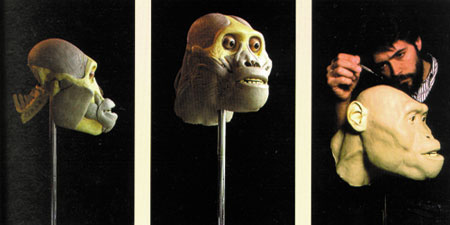
Above: Reconstruction of an imaginary half-human, half-ape. The article below bears an interesting headline suggestive of evolution, but contains nothing but a lot of strange nonsense.
From the point of view of content, these publications are often filled with complete misinformation but do contain striking layouts designed to mislead. Every detail has been considered in their formation. For example, the general appearance, cover design, page layout, colors used on the cover and the pages, the photographs and the style of language are all prepared with qualities that the reader will find attractive. The information and topics are presented in an attractive package to awaken trust in the reader. Hiding behind this mask of striking beauty, the spell will combine with the other elements to produce the desired effect. The reader won't suspect that such a magazine or book with its high-quality, authoritative appearance could propose a theory with no scientific foundation. For this reason alone, he won't feel it necessary to examine the truth of the theory of evolution for himself.
Once again, however, we must point out that the rhetorical accounts of evolutionists decorated with hundreds of fragments of bone labeled in Latin, and volumes filled with photographs can be completely invalidated by one plain and concise explanation. For example, a dense three-volume book with a supposedly scientific appearance can be proven wrong by a few paragraphs with true scientific value. In fact, as said before, all the information and accounts presented as scientific proofs in every evolutionist book are weak and insubstantial enough to be invalidated by a pamphlet you could fit into your.
EVOLUTIONIST INCULCATIONIST IN MEDIA



The media have exerted the greatest influence in getting the theory of evolution, with no scientific foundation, to be viewed as scientific reality. Various periodicals have kept the theory in the public eye by publishing regular articles about it. Apart from the media, we can see mass "selling" of evolution in scientific journals, encyclopedias and even biology texts. Books and magazines are published with striking covers, interesting page designs and color pictures, to attract attention with their visual effects and instill the suggestion that "evolution does exist."

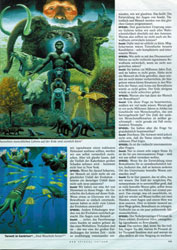

Evolutionists often create a spell with their visual presentations. Their illustrations of primitive human beings, cavemen and human ancestors are all imaginary. The sole purpose of the attractive page layouts and illustrations is to publicize the idea of evolution.k...
In our time, certain circles in the scientific world use Darwinism as a means of applying pressure. Various methods are used to intimidate scientists who don't accept this theory's validity. In order for a scientist to be accepted in certain academic circles—most of which are evolutionist—he must support the theory and even publish articles dealing with it. Those who do not are rejected by other scientists—also evolutionists—in that academic environment. Especially in the West, if a scientist wants to advance his career and become an associate or full professor, he must publish his articles according to a certain standard. As its most important element, this standard includes the absolute acceptance of the theory of evolution and the rejection of religion. In an article titled, "Scientists and Religion in America" published in the September 1999 Scientific American, Rodney Stark, a sociologist from Washington University, points out this pressure put on scientists, "There's been 200 years of marketing that if you want to be a scientific person you've got to keep your mind free of the fetters of religion." In research universities, "the religious people keep their mouths shut," Stark says, "And the irreligious people discriminate. There's a reward system to being irreligious in the upper echelons."64
One of the most serious problems faced by these scientists subjected to pressure occurs during the publication of their articles in scientific periodicals. Most well-known journals are controlled by people under the influence of the Darwinist spell, and they do not accept for publication articles by pro-Creationist scientists, so they cannot circulate their evidence against the theory of evolution.
Besides this, pro-Creationist scientists meet with many difficulties in the universities where they teach. To become a professor or to wield any influence in universities where the majority of the faculty is Darwinist, an individual must accept the theory of evolution. Those who do not accept this precondition are given no consideration or respect. Furthermore, attempts are even made to intimidate and deride them.
This is one of the evolutionists' most effective methods of suggestion used to perpetuate the Darwinist spell. For that reason, it will be useful to examine it in a little more depth.
Defamation is a morally evil attempt to harm another person and to humiliate him before his peers. Those who practice it also hope to elevate themselves to the forefront and receive the respect of others. For Darwinists who seek to win respect for their theory and harm their pro-Creationist colleagues, defamation is an indispensable tool. For this reason, it's the very basis of the Darwinist spell.
Everything that is said and written in evolutionist circles, their facial expressions and the way they look, is peppered with defamatory statements. Knowing that they cannot succeed on a scientific platform, they treat pro-Creationist scientists so as to destroy them psychologically. When proofs for the fact of Creation are presented to them, they make their puny statements twisting their mouths, eyes and eyebrows into scornful expressions. In this way, they hope to cover up their deficiencies and lack of knowledge. For example, one of the main proponents of the theory of evolution today is Richard Dawkins, who also makes frequent use of this disparaging style. In these words, he describes those who do not accept evolution:
It is absolutely safe to say that, if you meet somebody who claims not to believe in evolution, that person is ignorant, stupid or insane.65
As we can see from what he says, Dawkins closes his eyes to scientific proofs presented to him by anyone else, adopting a prejudiced stance in order not to break the Darwinist spell under which he labors, hoping to instill this same prejudice in others.
In this area, another method evolutionists use is to listen to a presentation on the facts of Creation and then, in an actively aggressive way, to assert that those influenced by it are deficient in some manner. They believe that these people are on the wrong path and they don't hesitate to call them names and assault their sacred values.
Another method evolutionists use is to make snide comments about books and articles critical of Darwinism. Instead of responding with scientific evidence, they try to pass over the matter with a dismissive smile. Peter Van Inwogen, professor of philosophy at Notre Dame University, in his review of Michael J. Behe's famous book, Darwin's Black Box comments on the prejudiced attitude of evolutionist scientists:
If Darwinians respond to this important book by ignoring it, misrepresenting it, or ridiculing it, that will be evidence in favor of the widespread suspicion that Darwinism today functions more as an ideology than as a scientific theory.66
Thus, we realize that the reason why Darwinists react snidely to scientific proofs is totally ideological. Evolutionists espouse it just in order that they can reject religion and the fact of Creation. And as we have said so far, still they use the Darwinist spell to perpetuate this rejection. At the basis of this method is treating opposing ideas with disdain. Using this behavior, they attempt to instill the suggestion that the way of evolution is the only way, and that believing in Creation will make people appear ridiculous. But Darwinists are making a great error and deceiving themselves.
37. David Jeremiah, Foreword to Henry Morris' The Long War Against God (Michigan: Baker Book House, 1996), p. 10.
38. Charles Darwin, The Origin of Species, Internet edition, Chapter VI. Difficulties on Theory
39. Francis Darwin, The Life and Letters of Charles Darwin, Internet edition, Charles Darwin's Letter to L. Jenyns (Rev. L. Blomfield). Down, [1845?].
40. Ibid., Chapter 1 I., The Darwin Family.
41. H. S. Lipson, "A Physicist's View of Darwin's Theory" Evolution Trends in Plants, Vol. 2, No. 1, 1988, p. 6.
42. Morris, H. M., The Long War Against God, p. 34.
43. Robert Shapiro, Origins: A Skeptic's Guide to the Creation of Life on Earth (New York: Summit Books, 1986), p. 130.
44. Arda Denkel, Cumhuriyet Bilim Teknik (Scientific Supplement), February 27, 1999, p. 15.
45. Ibid.
46. George P. Stavropoulos, "The Frontiers and Limits of Science" American Scientist, Vol. 65, November-December1977, p. 674.
47. Philip E. Johnson, Darwin on Trial, 2. ed. (Illinois: Intervarsity Press 1993, p. 132.
48. Umit Sayin, Bilim Utopya (Science Utopia Journal), November 1998, Vol. 53, p. 28.
49 .V. I. Lenin, Materialism and Empirio-criticism (Moscow: Progress Publishers, 1970), pp. 334-335, cited by Rennan Pekunlu, Bilim Utopya (Science Utopia Journal), December 1998, Vol. 54, p.15.
50. Richard Milner, Charles Darwin: Evolution of a Naturalist (New York: Facts on File, Inc., 1994), p.75
51. Behe, Darwin's Black Box, p. 176.
52. Christopher Wills, The Wisdom of the Genes: New Pathways in Evolution (New York: Basic Books, 1991), p. 8.
53. Johnson, Objections Sustained, p. 9.
54. Bilim Utopya (Science Utopia Journal), October 1998, p. 28.
55. Tim M. Berra, Evolution and the Myth of Creationism: A Basic Guide to the Facts in the Evolution Debate (Stanford, California: Stanford University Press, 1990), p. 117.
56. Richard Dawkins, The Selfish Gene, 2. ed. (Oxford: Oxford University Press, 1989), p. 2.
57. Giorgio de Santillana, and Hertha von Dechend, Hamlet's Mill: An Essay Investigating the Origins of Human Knowledge and Its Transmission Through Myth (Boston: Gambit Inc., 1969), p. 505.
58. Dawkins, The Selfish Gene, p. 3.
59. Behe, Darwin's Black Box, p. 4.
60. Julian Huxley, "Evolution and Genetics," Chapter 8 in What is Science?, (J. R. Newman, ed. New York: Simon and Schuster, 1955), p. 272
61. Richard E. Leakey and Roger Lewin, People of the Lake, Mankind and Its Beginnings (New York: Avon Books, 1979), p. 37.
62. Richard Leakey, The Origin of Humankind (New York: Basic Books, 1994), p. 65.
63. Ibid., pp. 73-74.
64. Edward J. Larson, and Larry Witham, "Scientists and Religion in America" Scientific American, September, 1999, p. 81.
65. Cited by Phillip E. Johnson, Darwin On Trial, p. 9.
66. Peter van Inwagen, Review about Michael Behe's Darwin's Black Box, Back Cover.